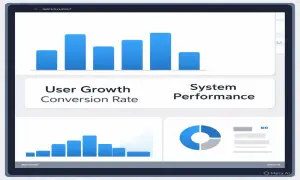Baby on Board: Why is infant milk seen as luxury for rich?
5 min readPakistan's news last week was all about the Finance (Supplementary) Bill, also known as the ‘mini budget.’ First introduced by the government last year in December, an amended version of the bill was finally passed by the National Assembly on Friday after much debate and opposition on the new taxation measures. One major point of contention was the 17% tax on infant formula milk.
The federal government had proposed to impose a 17 percent sales tax on locally produced infant formula milk, categorizing it as a “luxury product.” Opposition leaders and even PTI allies voiced concern over the possible implications of these new taxes. Chairman Pakistan People’s Party Bilawal Bhutto Zardari went as far as to say that Prime Minister Imran Khan is the “crisis of this century.”
The withdrawal of tax exemptions worth Rs343 billion, and making State Bank of Pakistan autonomous, were steps taken by the government in order to meet the requirements of International Monetary Fund for the revival of its $6 billion funding program.
Trying to make sense of the inclusion of infant milk in the list of taxed items, Head of Business Recorder website Bilal Memon said that it was an “ill-advised decision.”
“Pakistan has a low tax-to-GDP ratio, a lot of sectors go unnoticed, and hence, untaxed. So it makes sense for them to tax whatever they 'perceive' as luxury,” he added.
The proposed tax on infant formula milk caused an uproar on social media. Users blasted the government for taxing a “basic necessity,” that is essential for the survival of children.
One user said the victims of this “thoughtless taxation” would be mothers and children.
Another expressed shock over the government terming infant formula as an “elite” consumption item.
The criticism didn’t go unnoticed. Reacting to the debate, Finance minister Shaukat Tarin said on Tuesday that the government would try to exclude infant milk from the list of taxed items. As promised, amendments were made to the proposed bill and 17% GST was removed from all formula milk besides those worth Rs500.
However, the question still remains: Which quality formula milk costs less than Rs500?
If one does a cursory search on the internet for infant formula milk, one would find out that prices for such items start from Rs1000.
Formula milk is used by mothers on a large scale as prescribed under different medical conditions or for general use to provide basic nutrition to infants and children. Social media users said that taxing this item is contradictory to the government’s efforts to fight the problem of malnutrition in the country.
In his first address at the Prime Minister, Imran Khan drew attention to malnutrition prevalent in the country, and its impact on the mental and physical growth of children. The premiere had claimed that prevention of stunting would be one of the government’s top priorities.
According to UNICEF, nearly 10 million children in Pakistan suffer from stunting. Only 38% children are exclusively breastfed for the first six months of life. The rest depend on formula for survival. Making formula expensive puts these children’s lives at risk. If one were to rationalize the government’s decision to tax formula milk, one might say that it’s to encourage breastfeeding. However, “you cannot reach a Nobel cause by an evil path,” wrote lactation specialist Hareem Sumbul on Twitter.
Sumbul said that, “In a country where breastfeeding support is literally non-existent and relies on hearsay and resulting in PPD (Post-partum depression) most of the time, infant milk saved lives.”
“Promote breastfeeding and skilled breastfeeding support. I am willing and ready to train professionals. Aao. Seekho. Madad karo. Set up a BFeeding culture THEN slap taxes,” she added.
The debate on breastfeeding vs. formula milk is an old one, and it’s especially critical in developing nations.
According to a study cited in an NPR report, on leading corporations that manufacture infant formula and sell it to the world, these companies distributed free sachets to mothers and healthcare workers in developing nation as part of their marketing strategy for the product. The International Code of Marketing of Breast Milk Substitutes prohibited this technique and termed it “aggressive marketing.”
A public health expert said in the report, “In countries where women live in poor households with poor sanitation, it becomes a matter of life and death. If the water is not clean, formula becomes a death sentence for the infant.” Moreover, purchasing formula can use 30 percent or more of a poor family's income, he said. "Then, women start diluting the formula to make it last longer. Drinking watered down formula leads to malnourishment, illness and even death,” he added.
Zooming in back to Pakistan’s case where the percentage of exclusive breastfeeding in the first six months is a mere 38%, how is it possible to discourage formula milk in favour of mother’s milk besides making it inaccessible.
According to journalist Zofeen Ebrahim in her Op-ed in Dawn.com, malnutrition can be “rooted out in Pakistani children” by “ensuring the woman’s physical and mental well-being, especially during pregnancy and nursing.”
Taxing formula milk as a “luxury product” to discourage its use is not the answer to the problem of malnutrition.
“The first step towards translating this into action is by ensuring that just three essential food items — aata (wheat flour), daal (legumes) and cooking oil — are made so affordable that the poorest of families can sleep with a full stomach,” said Ebrahim.
Moreover, healthcare providers can emphasize the significance of breastfeeding at the time of birth.
Once the mother is well-nourished, and well-informed about the pros and cons of breast feeding and formula feeding, she can weigh what’s better for her children.
At the end of the day, it’s the mother’s decision to make.
For the latest news, follow us on Twitter @Aaj_Urdu. We are also on Facebook, Instagram and YouTube.


























Comments are closed on this story.